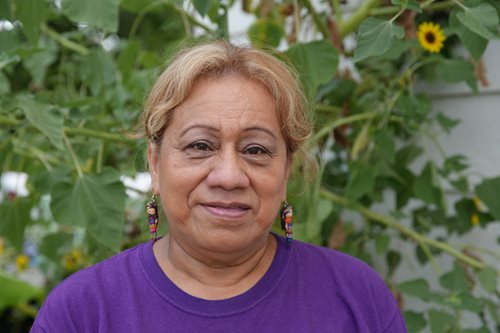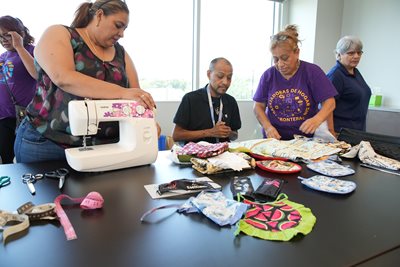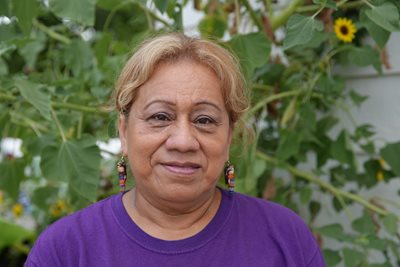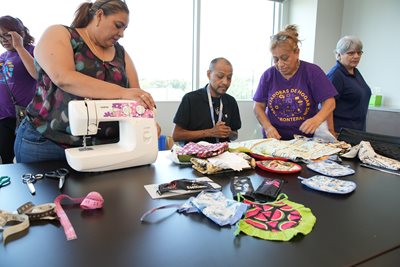Vaya al final de la página para leer esta historia en Español.
"When you are an immigrant," explains Consuelo Ramires, who moved to the U.S. 30 years ago from her native state of Chiapas in Mexico, "you work in any way you can to get ahead for your family."
That's what Ramires did, cleaning houses as a domestic worker in Houston, Texas. But soon, she was working for more than her immediate family — she was working for her whole community. That work included bringing together local domestic workers in an alliance and volunteering to help the older people in her neighborhood.
 For her involvement and leadership in her community, Ramires will receive the Dorothy Richardson Award for Resident Leadership. The award will be presented to Ramires and four other resident leaders in October during NeighborWorks America's Community Leadership Institute in San Francisco, California.
For her involvement and leadership in her community, Ramires will receive the Dorothy Richardson Award for Resident Leadership. The award will be presented to Ramires and four other resident leaders in October during NeighborWorks America's Community Leadership Institute in San Francisco, California. In a way, part of Ramires' story of helping her community begins where her marriage ended. She was a victim of domestic violence, she says, and after that, a victim of wage theft. A single mother with three children, she responded by empowering and educating herself. She's using what she's learned to help others.
Ramires says that during the worst times, she experienced homelessness with her children. It was for a short time, but "it was a very emotional time. I cried a lot," she says through an interpreter. She wished then that someone in the community had been looking out for her. Later, she says, she decided she could be one of the lookouts to help others. "It was necessary," she says. "I didn't want other women to go through the same thing."
That's part of the reason she began working with an alliance for domestic workers. Coming together, she says, "is instrumental for the fabric of society and the nation."
Fighting for her community
As she worked with both domestic workers and older residents in her community, Ramires quickly came to the conclusion that they needed more of a voice. "People were neglected by the powers that be. There were no sidewalks for people to walk. They didn't know about the power that exists in being civically active," she explains.
So she became civically active herself, showing others how to do the same. While she was not eligible to vote, she made sure those who were took their right seriously. She started a women's support group, discussing issues such as lack of fair wages, lack of insurance and workers' compensation. Avenue, the NeighborWorks network organization that nominated Ramires for her award, took the time to listen to her and the needs of the people she represents, she says. They also took the time to further strengthen her leadership skills, sending her to workshops and empowerment opportunities, including the NeighborWorks Community Leadership Institute.
"That allowed me to get more strength and continue to fight for my community," she says. One thing she learned was how to use social media to communicate to her audience about specific issues. She spends a lot of time on Facebook live, explaining things to followers.
Ramires has a few pillars she likes to share:
• Engage in civic processes so "neighborhoods get better representation and more resources," says Ramires, who drove people to the polls in 2022. She also calls for people to participate in the Census. In Harris County, her Census tract had the second highest participation rate.
• Language justice is essential. For many who live in her Houston neighborhood, Spanish is a first language. Interpreting is important for that community. "I raised my voice for language justice," she says.
• Education. She is especially grateful for the justice training fellowship, a program with the goal of embedding language justice principals and bridging the gap between the English-speaking community and the Spanish-speaking community. Avenue just graduated its third cohort in language justice in June.
Ramires says the pandemic was especially hard for domestic workers, many of whom lost employment for months. Those who did work needed protection, she says, so she scanned the community for facemasks and hand sanitizer. Avenue supported her efforts, helping distribute the items to families. An expert with a needle, Ramires also helped train domestic workers to sew facemasks early on in the pandemic, and those workers trained others. It was a way to create a different set of skills, and to generate other forms of income. The project resulted in 7,000 facemasks.
facemasks and hand sanitizer. Avenue supported her efforts, helping distribute the items to families. An expert with a needle, Ramires also helped train domestic workers to sew facemasks early on in the pandemic, and those workers trained others. It was a way to create a different set of skills, and to generate other forms of income. The project resulted in 7,000 facemasks.
 facemasks and hand sanitizer. Avenue supported her efforts, helping distribute the items to families. An expert with a needle, Ramires also helped train domestic workers to sew facemasks early on in the pandemic, and those workers trained others. It was a way to create a different set of skills, and to generate other forms of income. The project resulted in 7,000 facemasks.
facemasks and hand sanitizer. Avenue supported her efforts, helping distribute the items to families. An expert with a needle, Ramires also helped train domestic workers to sew facemasks early on in the pandemic, and those workers trained others. It was a way to create a different set of skills, and to generate other forms of income. The project resulted in 7,000 facemasks. Ramires also worked on food distribution, helping neighborhood residents fill out applications so they could get food packages. "Pasta, la leche, tomate, papas." The goal was to work with the Houston food bank to get people essential foods and ingredients.
"She was able to help a lot of people," says Daniel Candelaria, program coordinator for Community Advocacy at Avenue. "She has worked with us for quite a long time, setting up the GO Neighborhoods program in the Near Northside Community, working with the elderly. That's why we nominated her: She does a lot of work. If someone needs diapers for their children, or food, she helps galvanize the community to support one another."
Ramires worried that the older adults in her community were being ignored by politicians, by community members — even by family. "But they worked when they were young," she says. "They made the community a better place. It is up to the community leaders to look out for them, too."
Neighborhood outreach
Another important thing? Outreach. Ramires worked on the Safe Walk Home program, which started after an 11-year-old was stabbed to death on the way home from school in 2016. Ramires says a lot of domestic workers are unable to keep watch over their kids as they go to and from school, so she got involved in promoting the volunteer program.
Her family, whom she lives with, is often with her as she helps her neighborhood, especially Emma, 6 and Bella, 4. "My granddaughters have a lot of grandmas," she says, adding that it's important for her work to be intergenerational.
"Even during difficult times, my mom has taught me that there is always room for sharing," says Consuelo Martinez, who was named for her mother. "She has taught me the importance of voting, of educating myself, of being a decent human. She was a single mom that persevered through life's struggles."
Martinez relates a story of a car mechanic who lost his home and family to a fire at the peak of COVID-19. Martinez's family had immunity sensitivities, so he could not live with them, she says. But her mother helped transform his car into a temporary safe place. "She found him new clothes, blankets, pillows and shoes." During the day, he would work. At night, he parked at their home to rest. "My mom cooked him warm meals every day and would go outside to eat with him and have long talks."
As a child, Martinez says, she never realized that her own family was trying to make ends meet. "I always had a home-cooked meal, a caring mom, a good home … I am blessed to have been raised by her. It is the honor of my life to be named after her."
Ramires never stops working. She is now working with the Mexican consulate to try to establish a type of pension for domestic workers as they age. And she went to the capital with members of Avenue to advocate for more affordable housing.
"A lot of the community do not have the means to purchase a home, especially after the pandemic," Candelaria says. "Consuelo was part of the delegation that spoke."
Her goal, Ramires says, is "to develop the power in others and the voices in others so we can come together and defend ourselves from the forces that try to put us down. At the end of the day, what people want is to live in a safe neighborhood, that's safe for the children, and in a stable home."
Sometimes the best way is to help other people, she says, "is to help them realize they have a voice, and they have power and to use that voice."
Ayudando a una comunidad a encontrar su voz
"Cuando eres inmigrante, trabajas como puedes para sacar adelante a tu familia", explica Consuelo Ramires, que se trasladó a los Estados Unidos hace 30 años desde su estado natal de Chiapas, en México.
Eso es a lo que se dedicaba Ramires, limpiaba hogares como empleada doméstica en Houston, Texas. Pero de pronto no solo trabajaba para apoyar los intereses de su familia, sino también los de toda su comunidad. Ese trabajo incluía reunir a las trabajadoras domésticas locales en una alianza y ofrecerse como voluntaria para ayudar a las personas mayores de su vecindario.
 Por su implicación y liderazgo en su comunidad, Ramires recibirá el Premio Dorothy Richardson al Liderazgo Residente. El premio le será entregado a Ramires y a otros cuatro líderes comunitarios en octubre, durante el Instituto de Liderazgo Comunitario de NeighborWorks America en San Francisco, California.
Por su implicación y liderazgo en su comunidad, Ramires recibirá el Premio Dorothy Richardson al Liderazgo Residente. El premio le será entregado a Ramires y a otros cuatro líderes comunitarios en octubre, durante el Instituto de Liderazgo Comunitario de NeighborWorks America en San Francisco, California.En cierto modo, parte de la historia de Ramires de ayudar a su comunidad comienza en el momento que finalizó su matrimonio. Ella dice que fue víctima de la violencia doméstica, y después víctima del robo salarial. Madre soltera con tres hijos, respondió a esta situación motivándose y educándose a sí misma. Ahora utiliza lo aprendido para ayudar a los demás.
Ramires cuenta que, en los peores momentos, se quedó en la calle con sus hijos. Fue durante poco tiempo, pero "fue un momento muy emotivo. Lloré mucho", nos cuenta con la asistencia de un intérprete. En aquel momento deseaba que alguien de la comunidad hubiera estado pendiente de ella. Más tarde, cuenta, que decidió que ella podría ser esa persona que ayudaría a los demás. "Era necesario", afirma. "No quería que otras mujeres pasaran por lo mismo que yo".
Esa es parte de la razón por la que empezó a trabajar con una alianza de trabajadoras domésticas. La unión, asegura, "es fundamental para el tejido de la sociedad y la nación".
Luchando por su comunidad
Al trabajar con trabajadoras domésticas y ancianos de su comunidad, Ramires llegó rápidamente a la conclusión de que necesitaban que se les escuchara más. "La gente estaba desatendida por parte de las autoridades. No había aceras para que la gente pudiera pasear. No conocían el poder que existe cuando se es cívicamente activo", explica.
Así que ella misma se volvió cívicamente activa, mostrando a los demás cómo hacer lo mismo. Aunque no tenía derecho a voto, se aseguró de que los que sí lo tenían se tomaran en serio su derecho. Creó un grupo de ayuda a la mujer, en el que se hablaba de asuntos como la falta de salarios justos, la falta de seguros y las indemnizaciones laborales. Avenue, la organización de la red NeighborWorks quien nominó a Ramires para que fuera nominada al premio, se tomó el tiempo necesario para escucharla a ella y las necesidades de las personas a las que ella representa, afirma. También se tomaron el tiempo necesario para reforzar su capacidad de liderazgo, enviándola a talleres y oportunidades de empoderamiento, incluido el Instituto de Liderazgo Comunitario de NeighborWorks.
tomaron el tiempo necesario para reforzar su capacidad de liderazgo, enviándola a talleres y oportunidades de empoderamiento, incluido el Instituto de Liderazgo Comunitario de NeighborWorks.
 tomaron el tiempo necesario para reforzar su capacidad de liderazgo, enviándola a talleres y oportunidades de empoderamiento, incluido el Instituto de Liderazgo Comunitario de NeighborWorks.
tomaron el tiempo necesario para reforzar su capacidad de liderazgo, enviándola a talleres y oportunidades de empoderamiento, incluido el Instituto de Liderazgo Comunitario de NeighborWorks."Eso me permitió fortalecerme y seguir luchando por mi comunidad", afirma. Una de las cosas que aprendió fue a utilizar las redes sociales para comunicarse con su audiencia sobre temas concretos. Pasa mucho tiempo en Facebook Live, explicándoles cosas a sus seguidores.
Ramires tiene algunos puntos de referencia que le gusta compartir:
• Participa en los procesos cívicos para que "los vecindarios tengan mejor representación y más recursos", dice Ramires, que condujo a algunas personas a las urnas en 2022. También pide que la gente participe en el Censo. En el condado de Harris, su sección censal tuvo la segunda tasa de participación más alta.
• La justicia lingüística es fundamental. Para muchas personas que viven en su vecindario de Houston, el español es su primer idioma. La interpretación y la traducción son importantes para esta comunidad. "Alcé mi voz en favor de la justicia lingüística", asegura.
• La educación. Está muy agradecida por la beca de formación judicial, un programa cuyo objetivo es integrar los principios de justicia lingüística y salvar el espacio existente entre la comunidad anglófona y la comunidad hispanohablante. Avenue acaba de graduar a su tercera cohorte en justicia lingüística en junio.
Ramires explica que la pandemia fue una época muy dura para las trabajadoras domésticas, muchas de las cuales se quedaron sin empleo durante meses. Las que sí trabajaban necesitaban protección, nos cuenta, así que recorrió la comunidad en busca de mascarillas y desinfectante de manos. Avenue apoyó sus esfuerzos, ayudándola a distribuir los artículos a las familias. Como costurera experimentada, Ramires también ayudó a formar a trabajadoras domésticas para que cosieran mascarillas al comienzo de la pandemia, y esas trabajadoras formaron a otras. Fue una manera de crear un conjunto de habilidades diferentes, y de generar otras formas de ingresos. El proyecto dio como resultado la producción de 7.000 mascarillas.
Ramires también trabajó repartiendo alimentos, ayudando a los vecinos de su vecindario a rellenar solicitudes para que pudieran recibir paquetes de comida. "Pasta, la leche, tomates, papas". El objetivo era trabajar con el banco de alimentos de Houston para hacer llegar a la gente alimentos e ingredientes esenciales.
"Fue capaz de ayudar a muchísima gente", afirma Daniel Candelaria, coordinador del programa de Defensa Comunitaria de Avenue. "Lleva mucho tiempo colaborando con nosotros, creando el programa GO Neighborhoods en la comunidad de Near Northside, trabajando con personas mayores. Por eso la hemos nominado: Trabaja muchísimo. Si alguien necesita pañales para sus hijos o comida, ella ayuda a impulsar a la comunidad para que se apoye mutuamente".
A Ramires le preocupaba que los ancianos de su comunidad fueran ignorados por los políticos, por los miembros de la comunidad e incluso por sus parientes. "Pero ellos trabajaron cuando eran jóvenes", dice. "Hicieron que la comunidad fuera un lugar mejor. Corresponde a los líderes comunitarios preocuparse también por ellos".
Divulgación comunitaria
¿Otra cosa importante? La divulgación. Ramires trabajó en el programa Safe Walk Home (Camino Seguro a Casa), que empezó después de que un niño de 11 años muriera apuñalado cuando regresaba a su casa después de salir de la escuela en 2016. Ramires afirma que muchas trabajadoras domésticas no pueden estar pendientes de sus hijos cuando van a y regresan de la escuela, por lo que se implicó en la promoción del programa de voluntariado.
Su familia, con la que vive, la acompaña a menudo mientras presta ayuda a su vecindario, especialmente Emma, de 6 años, y Bella, de 4. "Mis nietas tienen muchas abuelas", asegura, y añade que es importante que su trabajo sea intergeneracional.
"Incluso durante los momentos complicados, mi madre me enseñó que siempre hay lugar para el compartir", afirma Consuelo Martínez, que lleva el nombre de su madre. "Me ha enseñado la importancia de votar, de formarme y de ser un ser humano decente. Fue una madre soltera que superó con perseverancia las dificultades de la vida".
Martínez cuenta la historia de un mecánico de automóviles que perdió su casa y a su familia en un incendio en el momento álgido de la COVID-19. La familia de Martínez tenía sensibilidades inmunitarias, por lo que él no podía vivir con ellos, afirma. Pero su madre ayudó a transformar su coche en un lugar seguro provisional. "Le encontró ropa nueva, mantas, almohadas y zapatos". Durante el día, él trabajaba. Y por la noche, aparcaba en su casa para descansar. "Mi madre le preparaba comidas calientes todos los días y salía afuera para comer con él y mantener largas conversaciones".
Martínez afirma que, de pequeña, nunca se dio cuenta de que su propia familia luchaba por llegar a fin de mes. "Siempre tuve comidas caseras, una madre cariñosa, un buen hogar... Tengo la suerte de haber sido criada por ella. Es todo un honor para mí llevar su nombre".
Ramires nunca deja de trabajar. Ahora trabaja con el consulado mexicano para intentar establecer un tipo de pensión para las trabajadoras domésticas cuando se hacen mayores. Y fue hasta la capital con miembros de Avenue para abogar por viviendas más asequibles.
"Gran parte de la comunidad no tiene recursos para comprar una casa, sobre todo después de la pandemia", afirma Daniel Candelaria. "Consuelo formó parte de la delegación que tomó la palabra".
Ramires afirma que su objetivo es "desarrollar en los demás el poder y las voces para que podamos unirnos y defendernos de las fuerzas que intentan doblegarnos". "En última instancia, lo que la gente quiere es vivir en un vecindario seguro, que sea seguro para los niños, y en un hogar estable".
A veces, la mejor manera de ayudar a los demás, afirma, "es ayudarles a que se den cuenta de que tienen voz y de que tienen poder y a que utilicen esa voz."

